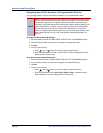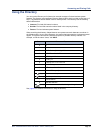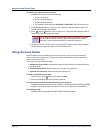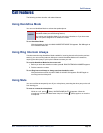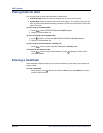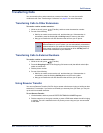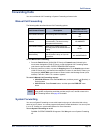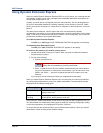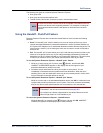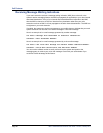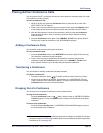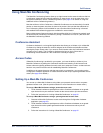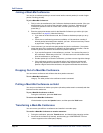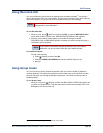
Call Features
Page 48 Mitel
®
5320/5330/5340 IP Phone User Guide – Issue 5, February 2011
Using Dynamic Extension Express
When you enable Dynamic Extension Express (DEE) on your IP phone, your incoming calls are
automatically routed to one or more preprogrammed associated destinations according to the
routing steps programmed for you.
Typically, your desk phone is configured to be your main extension. You may be programmed
for up to ten associated destinations including: softphone, home IP phone, voice mail, mobile
phone, home phone, desk phone 2, mobile phone 2, softphone 2, home IP phone 2, and home
phone 2.
Your desk phone, softphone, home IP phone and voice mail extensions are already
programmed in the system, so your system administrator can easily include them in your routing
steps. To include your mobile and home phone numbers in your routing steps, you will need to
provide these numbers to your system administrator.
To enable Dynamic Extension Express:
Dial 363 (on) or 364 (toggle on/off). PERSONAL ROUTING ON appears on the display.
To disable Dynamic Extension Express:
Dial 362 (off) or 364. PERSONAL ROUTING OFF appears on the display.
To answer a call routed to your mobile or home phone:
1. Answer the call when it rings your IP phone. After you speak, the Dynamic Extension
Express prompt is played.
2. Do one of the following:
Press # to accept the call.
Press * to send the call to the voice mailbox associated with your main extension
(not your mobile phone or home phone voice mailbox). If you do not have a voice
mailbox, the “Press *...” prompt is not played and the call is routed to your main
extension.
If you hang up, the call continues to follow your programmed routing steps.
When you enable Dynamic Extension Express, your incoming calls are routed as specified by
the routing type programmed for you by your system administrator. The table below provides
descriptions for the default routing types.
Check with your system administrator to see which routing type has been programmed for you.
Your administrator can modify these routing types by adding or removing routing steps, adding
or removing destinations, and changing the ring timers, if required.
To ensure that calls are routed correctly to your mobile and home phones, inform your system
administrator if either of these phone numbers change.
NOTE
You do not need to wait for the prompt to accept the call. You can
accept the call immediately by pressing the # button.
Routing Type Description
Mobile Twinning Calls simultaneously ring your desk phone and mobile phone, before
going to voice mail.
Delayed Mobile
Twinning
Calls ring your desk phone first, and then ring both your desk phone and
mobile phone, before going to voice mail.



